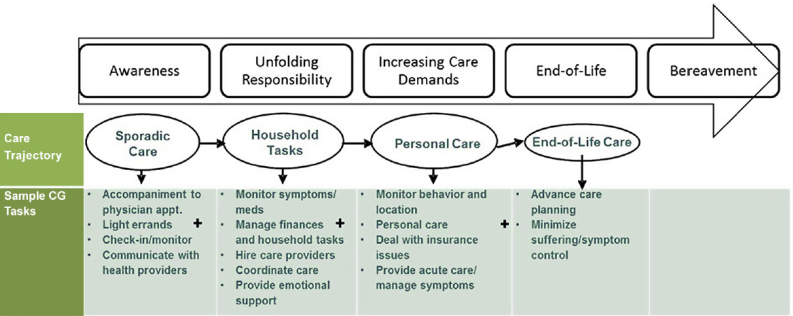A person’s decision to become a caregiver is not always made consciously. In many cases, it is a role assumed in response to circumstances that offer few alternatives. Serving as a caregiver for a parent, spouse, or resident is a big responsibility that’s constantly evolving and often becomes more complex as care needs increase. The term care trajectory refers to the progression in which the focus and nature of care shifts across various aspects of life as needs change. For individuals living with dementia, changes in care needs may occur gradually over the course of months or suddenly due to medical emergencies.

As dementia progresses and needs increase, caregiver responsibilities also grow. Individuals living with dementia may struggle to complete multi-step tasks with only distant supervision and may require more hands-on assistance. As dementia progresses, the caregiver’s role adapts accordingly, fostering the need for continued growth and development in caregiving skills. Even when tasks don’t involve hands-on care, caregivers provide essential support in social, emotional, and spiritual aspects every day.
While caregivers often have to make difficult decisions on behalf of a person living with dementia, it’s important to to continue asking them about their preferences and choices whenever possible. Finding the right balance between what is best for the person and what they want is an ongoing process, but with time and patience, it often becomes easier to navigate.
Due to the complexity of caregiving, preparation when possible can be important when taking on the role of decision maker. Education in dementia can help effectively manage the behavioral and physical symptoms throughout the dementia progression. Establishing a strong support system is also essential as the caregiving role evolves. This may include seeking professional assistance from social services or doctors, leaning on family support, and allowing time to process the many decisions and changes that may arise. Prioritizing personal well-being is crucial, as effective care for others begins with caring for oneself.
Caring for someone living with dementia is a journey of continual growth, both in skills and in understanding. As the needs of the person with dementia evolve, so does the caregiver’s role, requiring patience, adaptability, and compassion. Though the challenges are real, this path offers meaningful opportunities to deepen connections, discover inner strength, and make a lasting impact on another’s quality of life. With knowledge, support, and self-care, caregiving can become a profound experience of personal and relational growth.
SOURCE
Family Caregiving Roles and Impacts – Families Caring for an Aging America – NCBI Bookshelf

